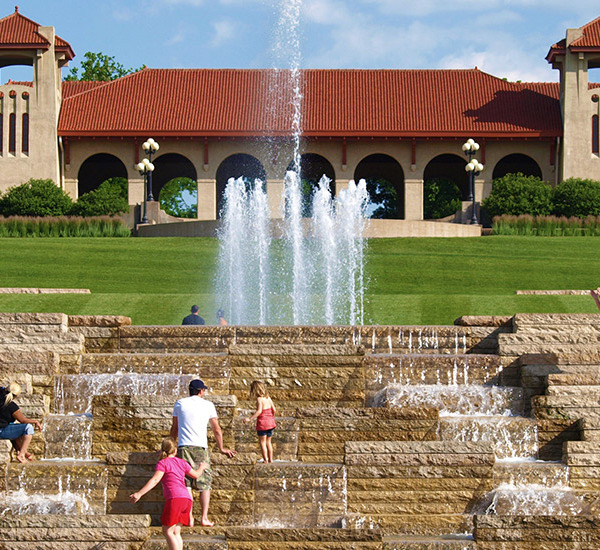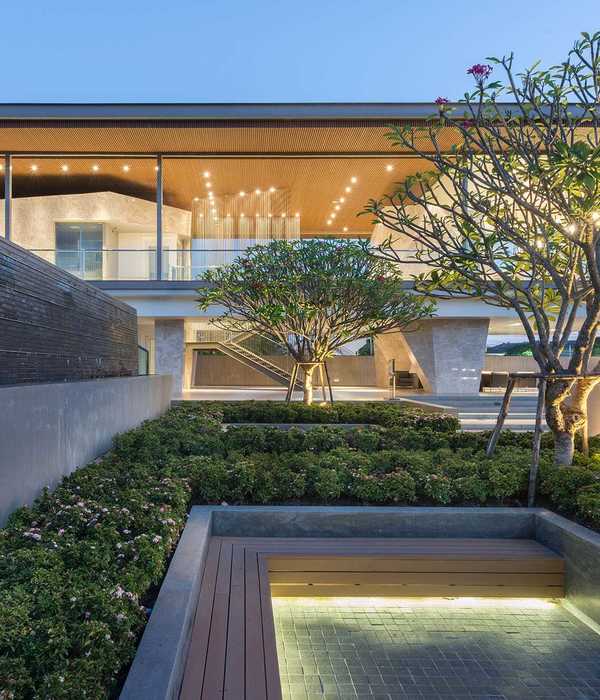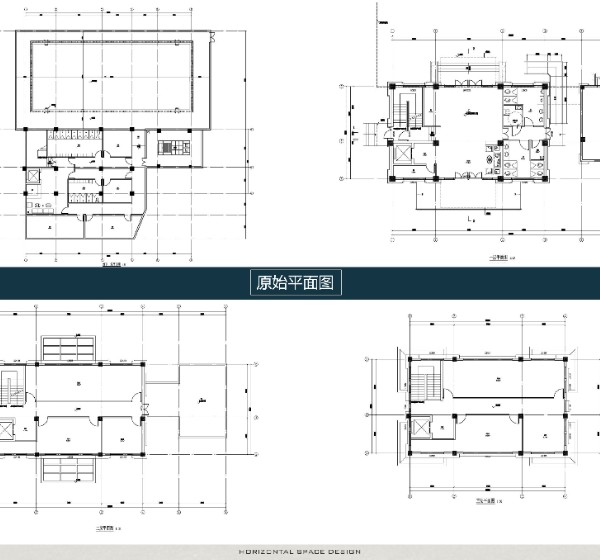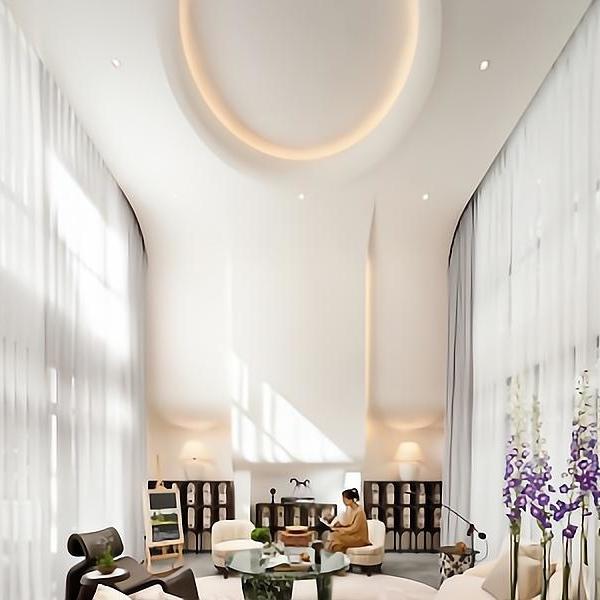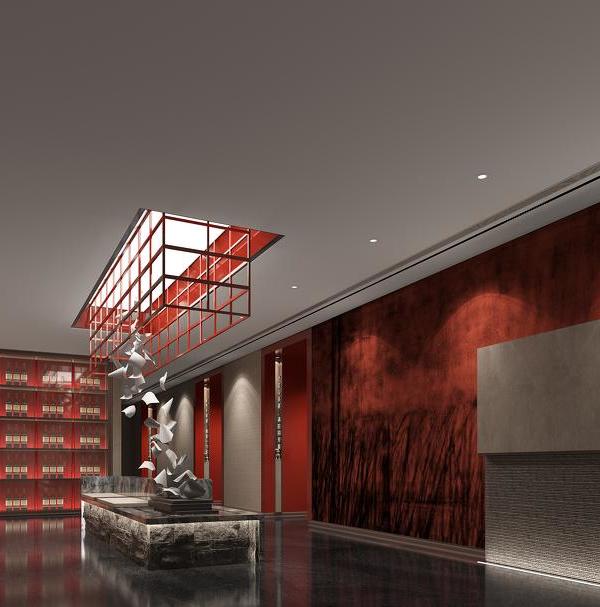这是直向建筑继海边图书馆、教堂之后的第三个在北戴河阿那亚社区中的海滨公共空间。餐厅紧邻图书馆,所以,怎样和一个强烈的、已存在的空间物体形成一个相适应的共存关系是设计的重要起点。图书馆是一个具有整体性和明确空间边界的精神性场所,风、光线和周边视野等自然元素在空间中被再次定义和塑造。在那里,人于海是一种“凝视”的关系。而对于餐厅,我们希望呈现出来的是一种非整体化的,更加轻松、日常的空间氛围。相对于图书馆中被“凝视”的角色,海在这里成为了某种背景,人在就餐之余瞟向大海,就不经意地看到了海上发生的一切。
▼鸟瞰,Aerial View ©苏圣亮 / 直向建筑
After the “Seashore Library” and “Seashore Chapel”, “Restaurant y Sea” completes the trilogy of Vector Architects’ seashore series at Aranya Community in Beidaihe New District. The restaurant is situated right behind the library across the beach. We initiated the design by investigating how to create a coexisting relationship with the mighty solid library volume. The library is a spiritual place with a clear boundary. The natural elements, like wind, light and surrounding views, are defined and shaped throughout the space where people can gaze upon the sea while sitting in the terraced library. As for the restaurant, we intend to establish a dispersed and a more casual everyday atmosphere. Instead of the seascape being the visual focus for people, as it is in the library, it acts as the backdrop in the restaurant. People will notice what happens on the sea as they dine and inadvertently glance towards it.
▼设计草图,Design Sketches ©直向建筑
餐厅碎化的空间边界及内院与场地中的树木相互嵌套,建筑空间随着周围隆起的地形呈现为一个无方向性的漂浮屋盖,在树林中若隐若现。树冠、屋盖与下方的就餐空间组成剖面上的三个层次。伴着海风,摇曳的树影透过屋顶天窗投映在就餐空间的墙面和地面上,忽明忽暗,自然与空间藉此被相互联接。种有树木的内院又为空间深处引入了光和风,同时也成为组织空间的枢纽元素。空间被院子分隔串联,又围绕着院子游弋开来。落地的清水混凝土院墙形成了整个建筑的抗剪受力系统,从而使得直径120mm的支承厚重檐口的细钢柱成为可能,钢柱的截面尺寸与周围的树干相仿,使它们在视觉上更易融入环境当中。
▼鸟瞰,Aerial View ©苏圣亮 / 直向建筑
▼入口门厅,Lobby ©苏圣亮 / 直向建筑
Trees are interlocked within the fragmented spatial boundary and courtyards. The architecture appears as a non-directional canopy floating above the undulant landscape, looming in the woods. From top to bottom, the tree crowns, building roof, and dining area underneath constitute the three major layers in the section sequentially. Tree branches sway with the sea breeze and cast their shadow through the skylights onto the wall and floor. The dining space becomes animated with the flickering of light and shadow, cultivating another dimension of indirect engagement between space and nature. The inner tree courtyards bring light and airflow deep into the restaurant, and at the same time, like hinges, they anchor the space. The courtyards simultaneously divide and connect the surrounding spaces. The full height fair-faced cast-in-place concrete walls of the courtyards resist the sheer force of the whole building, which makes it possible to support the load of the thick eaves on columns of only 120mm in diameter. This way, the slender steel elements, similar in diameter to the surrounding tree trunks, blend in the surrounding woods.
▼西北立面黄昏夜景,Dusk View of North-west Elevation ©陈颢 / 直向建筑
▼井字梁及天窗特写,A Close-up of the Waffle Beams and Skylight ©苏圣亮 / 直向建筑
▼通向屋顶平台的楼梯,Staircase to Roof Terrace ©苏圣亮 / 直向建筑
▼屋顶露台,Roof Terrace ©苏圣亮 / 直向建筑
▼庭院,Courtyard ©苏圣亮 / 直向建筑
▼从庭院望向檐下空间,View to the Space Under the Roof from the Courtyard ©苏圣亮 / 直向建筑
整个建筑没有明确的主入口,位于空间四周的推拉门可以被完全打开,此时,整个空间就变成了一个“亭子”。人在各个方向进入就餐空间之前,都会先进入一个被压低的檐下过渡空间,继而逐渐步入被光笼罩、浸染的中央隆起的屋盖下方。我们在这里有意识地通过高度来控制过量侧向直射光进入的干扰,从而保证由井字梁顶透光所形成的浮起的“云朵”般的空间氛围。井字梁的结构形式缓解了竖向受力构件的严格对位关系,在尽量减少结构墙体的出现的同时也使得平面的错位和流动性成为可能。
There is no designated main entrance for the restaurant. Instead, clear glass sliding doors are placed along the perimeter, which, when fully opened, cause the spatial boundary to disappear, turning the building into a “pavilion”. People can approach the dining space from any direction. They will firstly step into a transitional space with a lowered eave, and then gradually walk into the main dining area under a raised-up central roof, illuminated by immersive natural light. We consciously reduce the interference of excessive side light by controlling the clear height of the eaves, in order to create an atmosphere of being under a floating “cloud” as a result of the light-filtering waffle beams. The waffle beams remit the need for strictly aligned load-bearing elements and minimize the amount of structural walls, which help achieve the staggered fluidity of the plan.
▼从檐下空间望向海滩,View to the Beach from the Space Under the Roof ©苏圣亮 / 直向建筑
▼西立面近景,A Close up of West Elevation ©苏圣亮 / 直向建筑
▼檐下空间,Space Under the Roof ©苏圣亮 / 直向建筑
▼等候区,Waiting Area ©苏圣亮 / 直向建筑
▼从餐厅望向海滩,View to the Beach from the Restaurant ©陈颢 / 直向建筑
▼餐厅内景,Interior View of the Restaurant ©苏圣亮 / 直向建筑
▼主要就餐区,Main Dining Area ©陈颢 / 直向建筑
▼团体就餐区,Group Dining Area ©陈颢 / 直向建筑
▼餐厅内景,Interior View of the Restaurant ©苏圣亮 / 直向建筑
▼服务空间,Service Area ©陈颢 / 直向建筑
在我们看来,每一种建筑背后都指向了一种独特的生活关系和与之对应的情感方式。不同公共功能的空间里面也都包含着有别于日常房屋的意义。人的生活需求塑造了空间,同时又被空间影响。建筑中的视野、光和风,都是人和自然发生关系的途径,它们将人和外界紧密联系在了一起,日常的空间因此便具有了某种精神意义的暗示。
We envision that each type of architecture can essentially refer to a unique lifestyle as well as the emotional expression corresponding to it. These various public spaces take on a meaning beyond that of an everyday space. The demand of people’s lives sculpts them, while in the other way around these spaces affect people’s lives. Light, wind and view in architecture are all the paths leading people to interact with nature. They closely integrate people with the outside world, and ultimately, an everyday space will imply a kind of spiritual meaning.
▼餐厅内景,Interior View of the Restaurant ©苏圣亮 / 直向建筑
▼井字梁特写,A Close-up of Waffle Beams ©苏圣亮 / 直向建筑
▼庭院,Courtyard ©苏圣亮 / 直向建筑
▼屋顶,Roof ©苏圣亮 / 直向建筑
▼南立面黄昏夜景,Dusk View of South Elevation ©陈颢 / 直向建筑
▼从檐下看向图书馆,View from space under the roof to Seashore Library ©陈颢 / 直向建筑
▼项目模型,Project Model ©直向建筑
▼设计草图,Design Sketch ©直向建筑
▼总平面图,Master Plan ©直向建筑
▼首层平面图,First Floor Plan ©直向建筑
▼屋顶平面图,Roof Plan ©直向建筑
▼立面图,Elevations ©直向建筑
▼剖面图,Sections ©直向建筑
▼墙面结构细部,Wall Sections ©直向建筑
地理位置:北戴河新区,中国 建筑/室内/景观设计:直向建筑 主持建筑师:董功 项目建筑师:张恺 设计/建造管理:刘晨,孙栋平 项目成员:马小凯,江存裕、张鹏 驻场建筑师:张钊,涂单 结构及设备专业设计:中国建筑科学研究院 结构顾问:肖从真,储德文 灯光顾问:清华大学建筑学院张昕工作室 业主:天行九州旅游置业开发有限公司 结构类型:混凝土框架剪力墙结构 建筑材料:混凝土,钢,竹钢 建筑面积:713m2(地上626m2,地下87m2) 设计周期:10/2015-06/2016 建设周期:12/2016-01/2018 摄影:苏圣亮,陈颢
Location: Beidaihe New District, China Architecture/Interior/Landscape Design: Vector Architects Principal Architect: Gong Dong Project Architect: Kai Zhang Design/Construction Management: Chen Liu, Dongping Sun Design Team: Xiaokai Ma, Cunyu Jiang, Peng Zhang Site Architect: Zhao Zhang, Dan Tu Structural & MEP Engineering: China Academy of Building Research Structural Consultant: Congzhen Xiao, Dewen Chu Lighting Consultant: X Studio, School of Architecture, Tsinghua University Client: Beijing Rocfly Investment (Group) Co., Ltd. Structure: Concrete Frame-Shear Wall Structure Building Material: Concrete, Steel, Laminated Bamboo Building Area: 713㎡ (above ground 626㎡/ underground 87㎡) Design Period: 10/2015-06/2016 Construction Period: 12/2016-01/2018 Photograph: Su Shengliang, Chen Hao
{{item.text_origin}}





